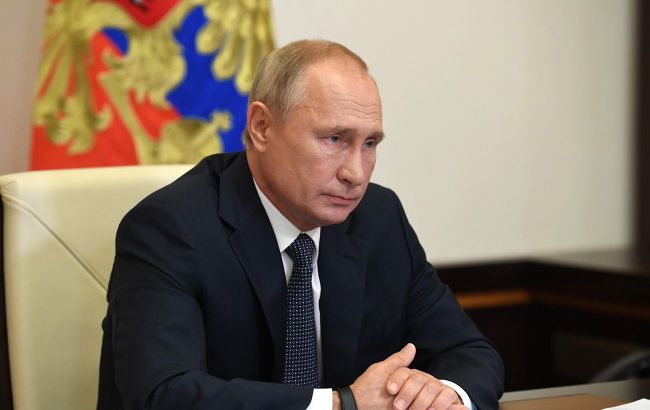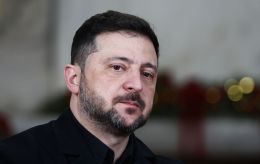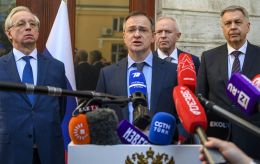Hamas attack marks end of Russia-Israel ties - WSJ
 Russian dictator Vladimir Putin (kremlin.ru)
Russian dictator Vladimir Putin (kremlin.ru)
For many years, the Prime Minister of Israel, Benjamin Netanyahu, maintained warm relations with the Russian dictator Vladimir Putin. However, a recent Hamas attack put an end to their ties, according to The Wall Street Journal.
Hamas invasion of Israel
As the media notes, even Russia's invasion of Ukrainian territory and the warming of its relations with Iran could not undermine the cooperation with Israel. The leaders of the countries continued to maintain a connection, and Netanyahu declared a neutral approach to the war in Ukraine, refusing to provide lethal aid or anti-aircraft defense systems to Ukraine.
"Now, after a deadly Hamas militant attack supported by Iran on Israel, these talks seem to have ceased. Putin is one of the few world leaders who did not call Netanyahu to express condolences for the death of over 1,300 Israelis killed by Hamas during this attack," WSJ reports.
Tectonic shifts in Russia's role in the Middle East
Since the start of the war in Ukraine, more significant tectonic shifts have been observed in Russia's role in the Middle East. In search of weapons and allies, Putin altered his relations with Iran and strengthened ties with Arab countries such as Egypt, Iraq, and the United Arab Emirates.
"Now, Moscow is considered a cornerstone of strategic relations with the Islamic Republic, which supplied thousands of Shahed drones," the media writes, adding that Russia, in turn, has supplied Iran with Yak-130 training aircraft and is considering selling Su-35 aircraft, which could shift the balance of air power in the Middle East.
For many years, Russia and Iran maintained relations with each other, but their relations were marred by distrust, as each side played with relations with the West.
"Russia is looking for a partner who can provide weapons, but its embrace of Iran is also influenced by broader anti-Western sentiments," says Nikolay Kozhanov, an expert on Russian-Iranian relations at Qatar University.
In particular, the embrace of Iran and Russia has extended to Hamas, sponsored by Tehran, which recently attacked Israel. In the past year, at least two high-level delegations flew to Moscow for talks.
Over the weekend, Hamas thanked the dictator for his position on the "ongoing Zionist aggression against our people and its rejection of the siege of Gaza."
In particular, the Russian Federation did not condemn the terrorist attack on Israel, and Russian State Duma Deputy Andrey Gurulyov, for his part, noted the Jerusalem-U.S. alliance and Moscow-Iran alliance with the "surrounding Muslim world."
It all began during the Soviet Union
Moscow's strengthening of ties with Iran today repeats the position of the Soviet Union, which during the Cold War, in order to counter American partners and preserve its position in the poorest countries in the world, armed Israel's biggest enemies. This, in turn, led to the Six-Day War in 1967 and the Yom Kippur War six years later.
The conflict in Israel plays into the Kremlin's hands
"Meanwhile, the Kremlin has internal reasons to welcome a war far from Russian borders. In the run-up to the presidential elections in Russia, scheduled for March, the Kremlin is looking for a way to distract from the war in Ukraine. Putin has often sustained his 23-year rule in Russia by using state media to ignore internal problems and focus on disorder abroad," the media writes.
Since the past weekend, the war in Ukraine has been pushed off the front pages of newspapers around the world and in Russia itself, where the media have shifted their focus to Israel and the Gaza Strip.
In particular, Russian officials believe that the conflict in Israel is a blow to the prestige of the United States and will force Washington to assess its capabilities for simultaneously providing assistance to Kyiv and Jerusalem.
"In his initial comments on Hamas attacks at the beginning of last week, Putin criticized the United States, calling these attacks 'a vivid example of the failure of United States policy in the Middle East,' which never defended the interests of the Palestinians in peaceful negotiations. On Friday, he stated that Israel has the right to defend itself against Hamas attacks but called for peace talks that would lead to the creation of an independent Palestinian state," the media adds.
Russian Foreign Minister Sergei Lavrov accused the United States of involvement. A few days after Hamas invaded, Lavrov met with the head of the League of Arab States, Ahmed Aboul Gheit. Both called for an immediate ceasefire and international support for negotiations.
Other Kremlin commentators noted that military actions in Israel meant that now two U.S. allies could be deprived of protection. Propagandist Solovyov, for his part, reposted news about the United States' decision in January to export 300,000 American 155-millimeter artillery shells from Israel's arsenal and hand them over to Ukrainian troops.
As noted by the prominent international relations expert Thomas Graham, Russian media will likely seize on any chaotic events in Israel or elsewhere to divert attention from internal problems in Russia.
Hamas attack on Israel
On October 7, Hamas terrorists launched an attack on Israel from the Gaza Strip. They took hostages, killed hundreds of civilians, and took control of some military facilities.
Israel declared a state of war and initiated a counterterrorism operation called Operation Iron Swords. The military revealed its plans to eliminate Hamas.

